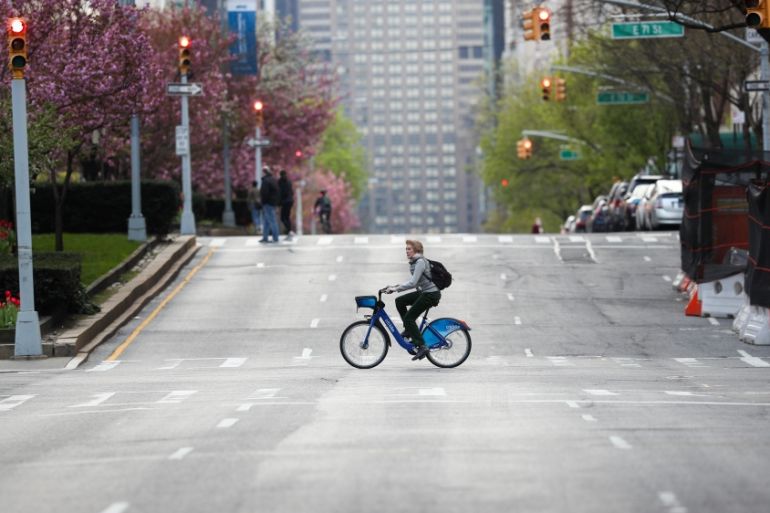Shares fall as global economy continues to face virus fallout
HSBC expects a weak economic recovery in Asia later in 2020, but the US economy remains badly affected by coronavirus.

Asian shares and United States stock futures fell, spurred by concerns over the damage caused to global growth by the coronavirus as new evidence of US economic damage surfaced.
MSCI’s broadest index of Asia-Pacific shares outside Japan was down 0.4 percent on Friday and US stock futures, the S&P 500 e-minis, were down 0.56 percent.
Keep reading
list of 3 itemsUS Congress gives final approval on $484bn relief package
UK economy crumbling as coronavirus deaths mount
Shares in China, where the coronavirus first emerged late last year, fell 0.79 percent.
Although economic growth is expected to return to Asia Pacific this year, led by China, the level of output by the fourth quarter will barely be above 1 percent of the previous year, said HSBC economist Frederic Neumann in a note to clients seen by Al Jazeera.
“The return of growth is comforting, especially for financial markets looking for a light at the end of the tunnel, but the cumulative shortfall in demand will also mean lingering financial pressures for some borrowers and fewer available jobs,” Neumann said.
In Japan, shares in the Nikkei stock index slid 0.84 percent amid lingering concern about the spread of infections before the Golden Week public holidays beginning April 29 and extending into early May. Tokyo governor Yuriko Koike suggested on Thursday that the holidays be extended and that people stay at home inorder to curb the spread of the virus.
Shares in South Korea, which has won recognition for its aggressive measures to contain the coronavirus, fell 1.11 percent.
Euro Stoxx 50 futures were down 2.23 percent, German DAX futures slipped 2.19 percent, and FTSE futures fell 1.36 percent.
Australian shares bucked the trend, rising 0.71 percent due to gains in the energy and resources sector.
Oil prices extended a tentative rebound from a price collapse this week that pushed US crude futures into negative for the first time ever, but investors remain concerned about weak energy demand and excess supplies of crude.
US crude ticked up 4.85 percent to $17.30 a barrel, while Brent crude rose 3.98 percent to $22.18 per barrel in Asia as some oil producers said they will bring forward output cuts.
But the outlook remains gloomy for oil as “the logistical nightmare of finding storage for physical delivery remains,” said Freddy Lim, chief investment officer of digital wealth management platform StashAway said.
“This means risk of another oil rout into the last trade date of the next delivery contract (May 19) lingers until we find an innovative solution to storage or we see more dramatic cuts in global oil production,” he told Al Jazeera.
“Credit risk concerns will remain elevated as markets ponder the eventual impact on banks’ exposure to non-performing loan in the energy sector. Sovereign risk outlook will likely remain gloomy for oil-producing nations,” Lim added.
Still, the US dollar headed for weekly gains against the Norwegian kroner, the Canadian dollar, and the Russian rouble as investors chose to sell the currencies of major oil producers and keep their funds in dollars.
The S&P 500 and the Nasdaq turned negative at the close on Thursday after a report that Gilead Sciences Inc’s antiviral drug remdesivir had failed to help severely ill COVID-19 patients in its first clinical trial.
Gilead said the findings were inconclusive because the study conducted in China was terminated early.
The markets’ sensitivity to news related to COVID-19 treatments reflected investors’ desperation for a sign of when the global economy might start returning to normal, Tim Ghriskey, chief investment strategist at New York-based wealth management firm Inverness Counsel told Reuters.
“Any piece of bad news is likely to rattle the market,” Ghriskey said. “Investors are keen for a semblance of hope that they can soon crawl out of their homes and get on with some form of normal life, even if with trepidation and fear.”
US business activity plumbed record lows in April, mirroring dire figures from Europe and Asia as strict stay-at-home orders crushed production, supply chains and consumer spending, a survey showed.
The US House of Representatives on Thursday passed a $484bn bill to expand federal loans to small businesses and hospitals overwhelmed by patients.
President Donald Trump, who has indicated he will sign the bill, said late Thursday that he may need to extend social distancing guidelines to early summer.